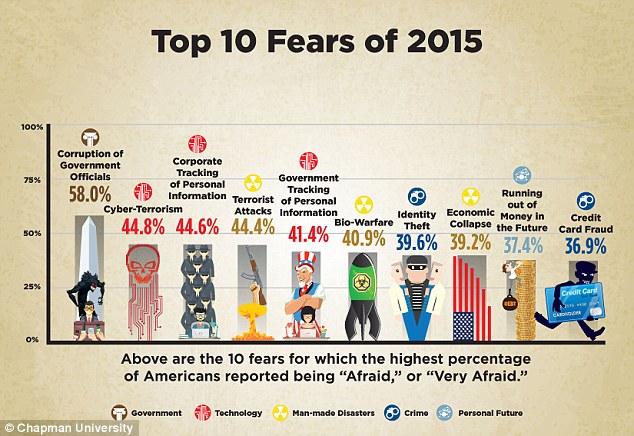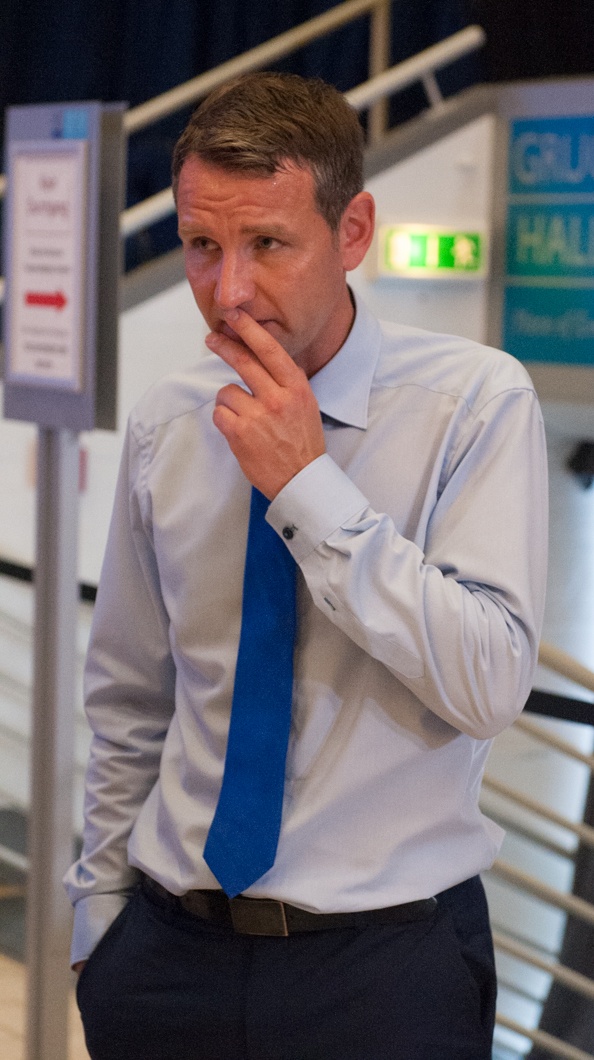He most probably won’t, but everyone who ever heard of Donald Trump may have had thought about what happens if Trump gets elected president. Maybe even a few of his supporters. This article asks the “what if” question and scratches along some issues that made the rise of Trump-superstar even possible.
Concluding from Trumps behaviour and his claims, which seem to follow no reasoning but his own mood, it seems unpredictable what Trump will do next. However, a picture can be drawn of a future where Trump is American president from this very unpredictability if we apply the paradigms of modern capitalism. These may be arguable but for an outlook on things they shall serve as basic premises of political mechanics on a global scale.
There are some commonly known paradigms about the modern world. For once, if you cannot put a price tag on something, it´s of no value. That includes humans, art as such and education to some degree. Another fact is that democracy is a facade, if not a show. For the latter, America is a role model not just in putting up electoral shows but abusing „democracy“ for imperialistic causes.
Values are attached to interests, hence they diverge from any socio-economic view. There is corporate interest in a economic manner; there is corporate interest in a social manner; there is individual interest – the hardest one to determine, especially with Donald Trump. All of them exist and interfere, creating an entwined pattern that constantly changes its shape. However, it seems that economic corporate interest is currently dictating life, enabling billionaires to even get considered by voters for a political role in a democracy. This fact points to the core of the (democratic) issue: that people support candidates but do not make candidates. The USA are a pioneering nation in putting up the right show for the election of presidential candidates where the voter’s support is just that: support, not election.
Why would that be?
Americas role in the world.
The USA have a well documented record of global economic dominance. Like any country in the world it fights an ongoing battle to secure resources. Unlike other countries however the USA are leading by exporting „values“ transported by its media industry and by securing interests by means of conflict and interfering with foreign governments to have them acting in favour of the western world.
The core of the issue is that the United States on one hand proclaim to be an independent nation that is based on democratic values and checks and balances but seemingly behaving as it is not guided by these. Poking around in internal affairs of a nation seems afetal unless the nation’s state is affecting foreign policies – which it does especially with the USA. The plain fact that many people outside the US know the name Trump as well as the election dates for American presidency indicates that internal affairs of the US are a concern to the rest of the world. Quick question: when is the next election for your national government?
Frankly, the US is the modern example of blending economic values with political ones. Especially the political term freedom seems to be overloaded with freedom of trade and economic liberty, hence there is the term neoliberalism. One could say, the democratic term „freedom“ has been replaced with its economic counterfeit, leading to decay of its meaning in a social context.
Things are of value if it can be determined economically. Humans, treated in a sense of human capital, are valued in this very context as valuable only if they can contribute to profit maximisation. Josef Marquard Wintrich once left a statement that became a mantra for law students in Germany: That an individual human is not to be degraded to a simple means, an object. It is a practical extract of Immanuel Kants philosophy prohibiting instrumentalisation of a human being.
Using people as cheap labour within the borders of a nation our outside, keeping them just below the existential minimum to survive (to function worker) is one fact that need scrutinising under the aspect of instrumentalisation. Leaving people in dire straits after a military invasion into their country is not just simple neglect but a means of weakening resistance to own enterprises on their land. Iraq, 1991 and after. The same goes for influencing, en- or dethroning foreign governments, ignoring democratic structures – before and after the process. Iran, 1953. The list is long and it is not to blame the USA as a nation; the land of opportunity has just nurtured a devastating corporate attitude that has gone global.
Trumps behaviour is a welcome change
Back to Trump: initially, his behaviour is erratic and it seems a big anti-pattern to current politics. The latter may be the reason why people see a change and a chance in it. „Make America great again“ is a sentence where its meaning can be dissected over a thousand pages. However, people need concise answers to their problems – which may seem addressed by Trump just by being „authentic“. This very “authenticity“ of Trump as one who speaks his mind and transports a feeling of „we can do“ – in a different way Obama did – seems like a welcome change for people tired of a wrongly understood political correctness.
This political correctness is meant in a wider meaning than just on American uni campuses with mixed student groups; in fact, I suspect it to be a motor of racism and nationalism as such people feel suppressed by PC. A suppression, subjectively perceived as such. There was a day when gaps in social life began to open by the closure of socially critical facilities such as public pools or public libraries (this is a claim by the author, as numbers are very hard to find, but Europe is a bright example of this currently happening). These gaps raise concern, anger with people. There’s a feeling creeping in that contains the conviction that the government either does not care or is helpless against an unleashed neoliberalism that demands competitiveness before anything else. Political correctness is a patch on these gaps that tries to render common sense obsolete.
There we go. Trump stands against these “gaps” – he speaks out. Political correctness as a patch gets ripped off the social issues but a bandage of nonsense is used to cover it up under some national pride. A pride that ties people together to solve their own problems. A pride with flaws, without brain; like a struggling animal that is in a blind rush to leave the trap it’s caught in.
A phenomena of the current capitalist system is that it lures with promises of wealth and leaves a void on the other side of it. As people search for meaning in their life, or at least guidance, the only guidance this system gives is consumerism. It has no other answer for the ever-growing group of people who do not succeed in this game. Trump acts as if he has an answer to everything – and if not, he blames the problem just for being their, shooting it. It must feel like a big relief when (verbally) shooting problems make them go away. Trump may incorporate a dream of a leader that people request once they run out of options with their current environment.
The American environment dictates: Without hard work no achievement; without the risk no reward; without a job no quality of living; without elbows no success. The latter is true as a fact but only within the current reality that is based on a questionable paradigm of growth. We talking about a subtle fear – not to be underestimated as its outlook is existentially devastation. An outlook that needs to be questioned too. Will you really suffer more when you are without a job? How far would you go to earn money? Would you work 200 hours for 35US$ in pursuit of the dream or the fear of starving?
Behavioural psychology has well documented that anxiety of loss is outweighing the driving force of emotions of pleasant experiences. Anxiety gets neurologically amplified by their „negative bias“ and remains longer as a pattern in our brains than others. Frankly, fear is the best motivation. It is about us westerners who cope with their own problems, sorrows and fears. The fear of losing our relative wealth for once. While it is estimated that the average Trump-voter has an annual income around $72.000 it does not affect the fact that fear of a degrading life standard is real. As real as the typical bliss ignorance of a western citizen. For instance, only one out of ten Americans can roughly identify the role of Edward Snowden.
Donald Trumps attitude seems fearless as he acts and speaks. The substance of his opinions falls way behind the way he is claiming them. It is an attitude found by scared people that push forward with a battlecry.
Trump as uncontrollable element? Who or what controls a(n American) politician?
In theory, a politician as a person is only controlled by his conscience. In praxis it is interest: Personal interest and corporate interest in its widest sense. Independently of the content of these interests, certain policies are beneficiary to certain people and groups. In a democracy, a basic principle is to benefit the majority of people. In this regard an answer to the question „who is controlled by whom“ would not be fruitful — people know that there’s an imbalance in the checks and balances. In fact the question needs to be: „Does modern democracy cater for the majority of people?“
It seems not. It seems that there is a major interest – not only in the USA – that is shared widely amongst political minds but not shared within the majority of people. This discrepancy points to a problem that appears when the mix of political parties and interests does not reflect the same in a cross section of community. And this is the main pillar of democracy: To mirror the dynamic shape of its citizens.
Lobbyism is neither new nor bad as such. But when it starts to bias the political landscape to diverge from the will of the people, it becomes a corrupting element that needs to be contained.
Is Trump someone who contains? He apparently isn’t capable to contain thoughts that should not leave his mouth. Not to say it is not politically correct, but it is not well-thought through. If Trump is against muslims is his right to be but to claim it, he has to support it with reasonable arguments. He cannot support anything with reason which would render his politics simply chaotic.
Would chaos be good for the USA?
Let’s identify the „USA“ again. It is a nation with liberal democratic foundations. It is not a corporate entity like a company that wants to make profit. So chaos is not good for the USA. Internally. However, foreign politics speak – and will speak, with either Trump or Clinton, another language. There is another war lurking around the corner. It will be resources – and ideally connected with some villain territory. A territory that used the be a country of civilians until they got corrupted by western influence. Which are CIA acts such as the Mossadegh Coup in Iran 1953 or the rise and fall of Iraq from 1991 onwards. It all resulted in desolation – in chaos – for the population in these countries. Apparently the current NATO partners to the USA positioning for another proxy war by surrounding Russia. It may be sabre-rattling to distract of the upcoming strike agains Iran which Hillary Clinton unsurprisingly predicted just last week.
The USA gave good examples in the past to enact political decisions based on general fear: The stale cold war made the American weapon industry billions of dollars; the slightest attitude towards social politics was trampled down by labeling such thoughts „communist“ – the worst thing an American citizen could become.
When the iron curtain got lifted, there was no more money in weapons and no support by the American population could have been expected. The industry needed another justification to build guns and shells.
That’s when Saddam Hussein became bad guy number one. And there were two wars on Iraq’s soil fired by the fear of weapons of mass destruction in the hands of a proclaimed mad man (which were never found) and the justified by the message to bring democracy, freedom and stability to the people.
Once Saddam was executed, the Twin Towers in New York fell with a bang that gripped the world in an instant. The „either with us or against us“ doctrine was introduced with the patriot act. Permanent fear of Americans to become victim of a terror attack on their own soil, lead nationalism to the rise. Any bomb produced to fight the scum that dared attacking the „free world“ was democratically justified. That was at least the message transported; no American citizen were shown dancing on the streets.
Then Al Quaida had its head chopped off. A new threat was needed and found in the IS – a child born of the American and European warfare in Iraq leaving a devastated country where more than half a million children died due to an embargo mainly controlled by the UK. While items like pencils were forbidden to be introduced into Iraq (reasoning of the British: they could be used for military purposes), people needed to make a living in a destructuralized, devastated country. The only infrastructure that has been safeguarded and nurtured were the oil rigs and their agency buildings. No soldiers around schools, museums, libraries or hospitals.
Asked whether the dead of thousands of children and citizens in Iraq was worth a price paying for oil, the US foreign minister Madeleine Albright stated: „we think the price is worth it.“ That said, who would not look differently at a bereft, angry Iraqi father burning an American flag publicly?
Why terrorism isn´t good business anymore.
Terrorism, as the western world would define it, is a thawb-wearing, bearded man with an AKA 47. This seems such a naive picture by writing or reading it that the matter of fact is saddening: It is the picture the western world got fed as people got fed propaganda times before. Out of personal experience, one friend did not shave his black beard before flying and got „mildly harassed“ in Australia, another friend got held and searched at a German airport because of his dreadlocks. The fact that racism can be activated in an instant may be connected with the simple and narrow focus of humans to phenomena. It is easy to distinct people by skin colour or the way they wear clothes or hair. But to answer the question whether every bald guy is a skinhead it takes more engagement with the matter. Time, people do not think they have nowadays anymore as time is money. Time that Donald Trump doesn’t take because it is all about emotions, on whatever grounds they are build up.
The war against terror was already a blatant charade agains Saddam Hussein. If any, he terrorised his own people. This problem did not get solved by the allies – on the contrary: It got deepened and allowed the IS to grow. While they are a threat to the people in Iraq, Syria, Egypt, they are not to the US Americans. At least not, if we put the 13000 Americans killed every year by American guns in contrast to killed people in terror attacks (more than twice the number of the 9/11 attacks victims). While it is not about number-crunching but the fear of imminent attacks it is a reality in the middle-east and a political instrument in the west.
This is taken straight from Wikipedia:
In a 2005 Gallup poll (U.S.), a national sample of adolescents between the ages of 13 and 17 were asked what they feared the most. The question was open-ended and participants were able to say whatever they wanted. The top ten fears were, in order: terrorist attacks, spiders, death, being a failure, war, criminal or gang violence, being alone, the future, and nuclear war.[4]
That’s a lot of buzzwords to contemplate a political strategy upon. But it has changed three years later:
In an estimate of what people fear the most, book author Bill Tancer analyzed the most frequent online queries that involved the phrase, „fear of…“ following the assumption that people tend to seek information on the issues that concern them the most. His top ten list of fears published 2008 consisted of flying, heights, clowns, intimacy, death, rejection, people, snakes, failure, and driving.[5]
What happened to the number one fear, terrorism? Is this what happens when there are no terrorist attacks on American soil for more than 15 years? What if people arranged themselves with the fear of terrorism but don’t fear it anymore? As ISIS, for instance, has no current face that can be used to depict a constant threat, there may be something bigger needed. Something institutionalised, involving a better definable, more powerful force that stands for the “bad” and “evil” in the American world.
Donald Trump is a fine example of a fear-monger and a motivational coach. He could be a motivator for Americans to make the war industry great again.
„In these cases specialists use False Evidence Appearing Real as a definition. Being scared makes people to anticipate and aggravate of what may lie ahead rather than plan and evaluate. E.g. Continuation of scholarly education, most educators perceive this as a risk that may cause them fear and stress[10] and they would rather teach things they’ve been taught than go and do research. “
It is not the fear of a terrorist attack so much but the fear of change that is imminent in us. Change brings unknown circumstances. Therefore the fear is irrational and can be fired with irrational arguments. Who is fitter than Donald Trump? Hillary Clinton? She will use the „false evidence appearing real“ as well but based on (not necessarily true) facts that fit in a frame of reasoning. A reasoning the society of American people may be tired of as it is worn and more conservative as the actual Republican Trump. The American election, a tough choice.
A motivation coach in patriotism and false-evidence-salesman can be beneficial for some industries at least. Trump could be beneficial for an ignorant American mind by distracting from some harsh realities too. Clinton covers another clientele. The ones that still believe in promises of the intertwined capitalist-democratic agenda. The current elections worldwide seem like a reality-check where people stand in a decaying system.
Dieser Post ist auch verfügbar auf: Englisch




